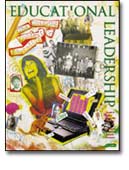September 2001
Making Standards Work
Applauded by some, derided by others, the standards movement has made an enormous impact on how we educate students. How do standards translate from theory into classroom practice? What strategies are teachers using to integrate standards into the curriculum? How do educators balance formal standards and assessments with efforts to personalize learning and differentiate instruction? Has the backlash against standards had an effect? For better or worse, standards are here. This issue asks, What are we doing about them?
Deadline: April 1, 2001
October 2001
What Should We Teach?
Educators agree that students need to learn reading, writing, and arithmetic. But what about character and civics, robotics and advanced physics? Should resources be used for elective courses, such as music, visual arts, and drama, or should schools concentrate on core subjects like science, math, and English?
This issue will examine how electives are changing to meet the needs of students in the 21st century. Where do nonacademic subjects fit in the standards movement? Do students benefit from electives or would they be better served with more traditional coursework? What is the role of schools: to prepare students for college, for careers, for life? International perspectives of special interest.
Deadline: May 1, 2001
November 2001
Understanding Learning Differences
Research on cognition brings new insights about learning differences, strengths, and disabilities. Currently, about 2.4 million children are diagnosed with learning disabilities, and many are underachieving at school. What are we learning about identifying, treating, and teaching those who have difficulties in listening, thinking, speaking, reading, writing, or doing math? Does using multiple teaching strategies facilitate all students' achievement? Topics will also include responding to the needs of gifted students and to language minorities.
Deadline: June 1, 2001
December 2001/January 2002
Schools and the Law
The First Amendment protects citizens' rights to a free press, free speech, assembly, and the practice of religion. How has the First Amendment played out in schools: the minute of silence, student journalism, book selection? How can schools seek common ground and protect the rights of students and staff?
In addition, recent court cases have focused on such school issues as zero tolerance policies, the teaching of evolution, desegregation, drug testing, and the confidentiality of student records. How have schools handled recent court rulings? What are the roles of teachers in handling and responding to these sensitive issues?
Deadline: July 1, 2001
February 2002
Class Size, School Size
What do research and practice say about effective class size? How should class size change instructional strategies? We're looking for stories from practitioners who can offer strategies for teaching small and large classes.
What does research say about the benefits of large and small schools? How does school size relate to curriculum, pedagogy, and student achievement? How do large schools create a sense of community—schools-within-a-school, 9th grade houses, academies? How do funding issues affect school size?
Deadline: September 1, 2001
March 2002
Redesigning Professional Development
Our concept of effective professional development is undergoing dramatic change. Not satisfied with the one-stop workshop, educators are creating opportunities that are job-embedded, ongoing, interactive, and linked to student achievement.
How do educators—who are already overextended—make the necessary time commitments? Has the emphasis on tests influenced the content of professional development? What about the role of study groups, peer coaches, mentors, online networks, and consultants? How does the new professional development help the new teacher? International perspectives of special interest.
Deadline: October 1, 2001
April 2002
Customizing Our Schools
We get our computers, jeans, and burgers made our way—so why not our education? In a time of standards in education, some schools are creating unique identities for themselves.
How does the culture of the community affect the school and the curriculum? How can schools adapt to meet the needs of the populations they serve? This issue will include articles about charter schools, voucher plans, magnets, homeschooling, and online and commercial endeavors. From internships to flexible hours, which alternatives make sense? Can—and should—families custom-design education?
Deadline: November 1, 2001
May 2002
The Instructional Leader
New licensing exams for educators focus on problem solving, community relations, and student learning rather than on traditional management issues. Such tests signal new expectations of educational leaders—from superintendents to lead teachers. Instructional leaders are expected to mentor colleagues and to create learning environments for the success of all students.
What does it mean to be an instructional leader? How are instructional leaders dealing with demographic and technological changes? How are they keeping informed about new content and pedagogy? What research-based instructional strategies work?
Deadline: December 1, 2001
